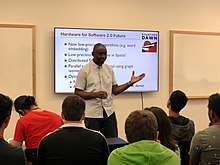Kunle Olukotun
Oyekunle Ayinde (Kunle) Olukotun is the Cadence Design Systems Professor in the School of Engineering and a professor of electrical engineering and computer science at Stanford University and director of the Pervasive Parallelism Laboratory. His research interests include computer architecture, parallel programming environments and scalable parallel systems, domain specific languages, and high-level compilers.[1][2].
Kunle Olukotun | |
|---|---|
 | |
| Born | London, England |
| Alma mater | University of Michigan, 1991 |
| Known for |
|
| Awards |
|
| Scientific career | |
| Fields | high-performance computer architecture; parallel computing |
| Institutions | Stanford University |
| Doctoral advisor | Trevor N. Mudge |
Education
Olukotun did his undergraduate studies at Calvin College,[3] in Grand Rapids, MI. He earned an MS (1987) and PhD (1991) from University of Michigan, in Computer Science and Engineering. His advisor was Trevor N. Mudge.[4]
Career
Olukotun joined Stanford's Department of Electrical Engineering in 1991. In 2000 he founded Afara Websystems, Inc.,[5] a company that designed and manufactured low power server systems with chip multiprocessor technology. Afara was purchased by Sun Microsystems, Inc. in 2002.[6] While at Sun, Olukotun was one of the architects of the 2005 UltraSPARC T1 processor.[7] From 2002 to 2017, he was a visiting professor at Oracle's Processor and Network Products.
In 2017 Olukotun and Chris Ré founded SambaNova Systems. SambaNova Systems is developing a next-generation computing platform to power machine learning and data analytics.[8]
Research
Olukotun's research focus is in computer architecture, parallel programming environments and scalable parallel systems, domain specific languages, and high-level compilers.
Olukotun lead the Stanford Hydra chip multiprocessor (CMP) research project, revolutionizing computing by bringing multi-core technology to consumers and high-end computing systems.[9]
In the mid-1990s, Olukotun and his co-authors argued that multi-core computer processors were likely to make better use of hardware than existing superscalar designs.[10]
In 2008, Olukotun returned to Stanford, and founded the Pervasive Parallelism Laboratory at Stanford after gathering US$6M in funding from several computer-industry corporations.[11] His recent work focuses on domain-specific programming languages that can allow algorithms to be easily adapted to multiple different types of parallel hardware including multi-core systems, graphics processing units, and field-programmable gate arrays.[12]
Olukotun is also a member of the board of advisors of UDC, a Nigerian venture capital firm.[3] He was elected as a Fellow of the Association for Computing Machinery in 2006 for his "contributions to multiprocessors on a chip and multi threaded processor design".[13] He became a Fellow of the IEEE in 2008.[14]
Olukotun has used several words from his Yoruba heritage in his research. Afara, the name of the company he founded, means "bridge" in the Yoruba language, and he has named his server at Stanford Ogun after the Yoruba god of iron and steel, a play on words since large computers are frequently called big iron.[15]
Olukotun directs the Stanford Pervasive Parallelism Lab (PPL) which seeks to proliferate the use of parallelism in all application areas. He is also a member of the Data Analytics for What's Next (DAWN) Lab.[16]
Kunle holds 12 U.S. patents.[17] He has published more than 150 scientific papers and wrote two textbooks.
Awards and Honors
Books
- S. W. Keckler, K. Olukotun, and H. P. Hofstee, Multicore Processors and Systems (Springer Publishing Company, Inc., 2009).
- K. Olukotun, L. Hammond, J. Laudon, Chip Multiprocessor Architecture: Techniques to Improve Throughput and Latency, Synthesis Lectures on Computer Architecture (Morgan Claypool Publishers, 2007).
References
- EE faculty listing, CS faculty listing, and (broken link) Pervasive Parallel Laboratory team listing Archived 2011-08-25 at the Wayback Machine, Stanford U., retrieved 2018-08-15.
- "For Black History Month, CSE Spotlights Faculty and Alumni in Academia= eecs.umich.edu". May 5, 2012. Retrieved November 9, 2019.
- About the company, UDC, retrieved 2011-04-01.
- The dates of his PhD vary by source. His personal web site and Stanford Engineering faculty profile (retrieved 2018-08-15) state it as 1991. It is also 1991 according to Oyekunle A. Olukotun at the Mathematics Genealogy Project. In the entry for his dissertation in the ACM digital library, the year is stated as 1992.
- Wayback Machine - www.afara.com
- Crunchbase.com/person/kunle-olukotun
- Kongetira, P.; Aingaran, K.; Olukotun, K. (2005), "Niagara: a 32-way multithreaded Sparc processor", IEEE Micro, 25 (2): 21–29, doi:10.1109/MM.2005.35.
- SambaNova Systems/News
- Alum Startup Collects $56M in Funding for AI Chip Research, 2018
- Olukotun, Kunle; Nayfeh, Basem A.; Hammond, Lance; Wilson, Ken; Chang, Kunyung (1996), "The case for a single-chip multiprocessor", Proc. 7th ACM Int. Conf. Architectural Support for Programming Languages and Operating Systems (ASPLOS-VII), pp. 2–11, doi:10.1145/237090.237140.
- Vance, Ashlee (April 30, 2008), "Stanford grabs $6m to shape the future of software", The Register.
- PPL Projects Archived 2011-08-08 at the Wayback Machine, retrieved 2011-04-01.
- Oyekunle A Olukotun ACM Award Winner page, ACM, retrieved 2018-02-18.
- IEEE Fellows directory, retrieved 2011-04-01.
- Irele, Abiola; Jeyifo, Biodun (2010), The Oxford Encyclopedia of African Thought, 1, Oxford University Press US, p. 197, ISBN 978-0-19-533473-9. See also an email from Olukotun explaining the name, 2006, reproduced at Cognitive Diary.
- Stanford DAWN Research Project website
- Justia.com
- IEEE Harry H. Goode Award
- Michigan Engineering Alumni Merit Award, 2017
- ACM Fellow, 2006
External links
- Profile page at Stanford
- Kunle Olukotun at DBLP Bibliography Server

- Google Scholar